

Working Adults. Work-related stress. Symptoms of work-related stress Work-related stress is a growing problem around the world that affects not only the health and well-being of employees, but also the productivity of organisations.
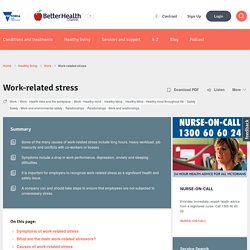
Work-related stress arises where work demands of various types and combinations exceed the person’s capacity and capability to cope. Work-related stress is the second most common compensated illness/injury in Australia, after musculoskeletal disorders. Work-related stress can be caused by various events. For example, a person might feel under pressure if the demands of their job (such as hours or responsibilities) are greater than they can comfortably manage. In Australian, more than $133.9 million was paid in benefits to workers who had made claims related to workplace stress during the 2004/2005 tax year.
Stress in the Workplace. In today's economic upheavals, downsizing, layoff, merger and bankruptcies have cost hundreds of thousands of workers their jobs.
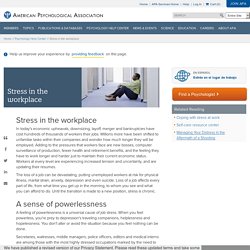
Millions more have been shifted to unfamiliar tasks within their companies and wonder how much longer they will be employed. Adding to the pressures that workers face are new bosses, computer surveillance of production, fewer health and retirement benefits, and the feeling they have to work longer and harder just to maintain their current economic status. Workers at every level are experiencing increased tension and uncertainty, and are updating their resumes. The loss of a job can be devastating, putting unemployed workers at risk for physical illness, marital strain, anxiety, depression and even suicide.
Loss of a job affects every part of life, from what time you get up in the morning, to whom you see and what you can afford to do. Effects of Stress on Working Adults - Health. Effects of Stress on Working Adults - Burnout.
Zimbardo, P. G., Johnson, R. L., & McCann, V. (201😎. Psychology: Core concepts (8th ed.). Hoboken, NJ: Pearson. – kenlee002
Benefits of Stress on Working Adults.
Boswell, W. R., Olson-Buchanan, J. B., & Lepine, M. A. (2004). Relations between stress and work outcomes: The role of felt challenge, job control, and psychological strain. Journal of Vocational Behavior, 64(1), 165–181. doi: 10.1016/s0001-8791(03)00049-6 – kenlee002
Work stress outcomes. Workplace Stress Survey. 2 Approaches to Healthy Coping - Emotional & Problem. Healthy coping for stress. Coping with stress at work. Best ways to manage stress. Goal setting and relaxation techniques reduce stress and ease the physical and emotional burdenit can take.
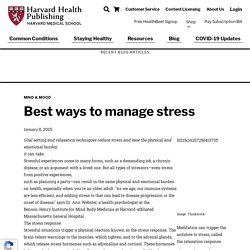
Stressful experiences come in many forms, such as a demanding job, a chronic disease, or an argument with a loved one. But all types of stressors—even stress from positive experiences,such as planning a party—can result in the same physical and emotional burden on health, especially when you're an older adult. "As we age, our immune systems are less efficient, and adding stress to that can lead to disease progression or the onset of disease," says Dr. Ann Webster, a health psychologist at the Benson-Henry Institute for Mind Body Medicine at Harvard-affiliated Massachusetts General Hospital. How to manage and reduce stress. Here, we would like to start, by giving you an introduction to what stress is, what the signs of stress are, what simple steps you can take when feeling stressed and provide practical advice for preventing it, to show why we are passionate about moving towards a less stressed nation.
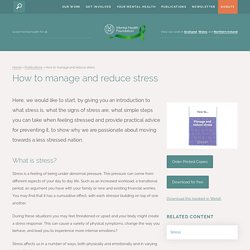
What is stress? Stress is a feeling of being under abnormal pressure. This pressure can come from different aspects of your day to day life. Such as an increased workload, a transitional period, an argument you have with your family or new and existing financial worries. You may find that it has a cumulative effect, with each stressor building on top of one another. During these situations you may feel threatened or upset and your body might create a stress response. Watch out for unhealthy responses to stress. You probably have your own ways of dealing with stressful times.
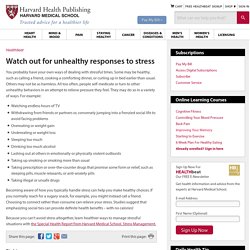
Some may be healthy, such as calling a friend, cooking a comforting dinner, or curling up in bed earlier than usual. Others may not be as harmless. All too often, people self-medicate or turn to other unhealthy behaviors in an attempt to relieve pressure they feel. They may do so in a variety of ways. For example: Watching endless hours of TV Withdrawing from friends or partners or, conversely jumping into a frenzied social life to avoid facing problems Overeating or weight gain Undereating or weight loss Sleeping too much Drinking too much alcohol Lashing out at others in emotionally or physically violent outbursts Taking up smoking or smoking more than usual Taking prescription or over-the-counter drugs that promise some form or relief, such as sleeping pills, muscle relaxants, or anti-anxiety pills Taking illegal or unsafe drugs Becoming aware of how you typically handle stress can help you make healthy choices.
Singapore Helpline.